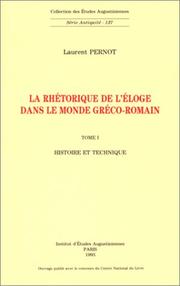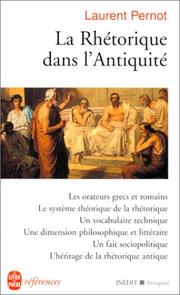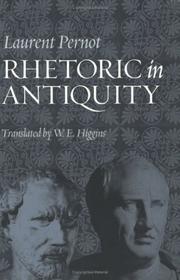| Listing 1 - 10 of 40 | << page >> |
Sort by
|
Book
ISBN: 9789004175020 9004175024 9786612949593 9047428471 1282949594 9789047428473 Year: 2009 Volume: 1 Publisher: Leiden ; Boston : Brill,
Abstract | Keywords | Export | Availability | Bookmark
 Loading...
Loading...Choose an application
- Reference Manager
- EndNote
- RefWorks (Direct export to RefWorks)
This volume gathers over forty papers by leading scholars in the field of the history of rhetoric. It illustrates the current trends in this new area of research and offers a great richness of insights. The contributors are from fourteen different countries in Europe, America and Asia ; the majority of the papers are in English and French, some others in German, Italian, and Spanish. The texts and subjects covered include the Bible, Classical Antiquity, Medieval and Modern Europe, Chinese and Korean civilization, and the contemporary world. Word, speech, language and institutions are addressed from several points of view. One major topic, among many others, is Rhetoric and Religion.
Literary rhetorics --- Rhetoric --- Rhétorique --- History. --- Histoire --- Reasoning. --- Rhetoric - History. --- Rhetoric -- History. --- Rhetoric. --- Languages & Literatures --- Literature - General --- History --- Rhétorique
Book
ISBN: 9780292768208 0292768206 0292768214 Year: 2015 Publisher: Austin : University of Texas Press,
Abstract | Keywords | Export | Availability | Bookmark
 Loading...
Loading...Choose an application
- Reference Manager
- EndNote
- RefWorks (Direct export to RefWorks)
Speeches of praise and blame constituted a form of oratory put to brilliant and creative use in the classical Greek period (fifth to fourth century BC) and the Roman imperial period (first to fourth century AD), and they have influenced public speakers through all the succeeding ages. Yet unlike the other classical genres of rhetoric, epideictic rhetoric remains something of a mystery. It was the least important genre at the start of Greek oratory, but its role grew exponentially in subsequent periods, even though epideictic orations were not meant to elicit any action on the part of the listener, as judicial and deliberative speeches attempted to do. So why did the ancients value the oratory of praise so highly? In Epideictic Rhetoric, Laurent Pernot offers an authoritative overview of the genre that surveys its history in ancient Greece and Rome, its technical aspects, and its social function. He begins by defining epideictic rhetoric and tracing its evolution from its first realizations in classical Greece to its eloquent triumph in the Greco-Roman world. No longer were speeches limited to tribunals, assemblies, and courts—they now involved ceremonies as well, which changed the political and social implications of public speaking. Pernot analyzes the techniques of praise, both as stipulated by theoreticians and as practiced by orators. He describes how epideictic rhetoric functioned to give shape to the representations and common beliefs of a group, render explicit and justify accepted values, and offer lessons on new values. Finally, Pernot incorporates current research about rhetoric into the analysis of praise.
Rhetoric, Ancient. --- Speeches, addresses, etc., Greek --- Speeches, addresses, etc., Latin --- Oratory, Ancient. --- Praise in literature. --- Blame in literature. --- Rhétorique ancienne --- Discours grecs --- Discours latins --- Eloquence antique --- Eloges dans la littérature --- Blâme dans la littérature --- History and criticism. --- Histoire et critique --- Rhétorique ancienne --- Eloges dans la littérature --- Blâme dans la littérature --- Ancient rhetoric --- Classical languages --- Greek language --- Greek rhetoric --- Latin language --- Latin rhetoric --- Rhetoric

ISBN: 2851211358 2851211366 9782851211354 9782851211361 Year: 1993 Volume: 137-138 Publisher: Paris : Turnhout : Institut d'études augustiniennes, Brepols,
Abstract | Keywords | Export | Availability | Bookmark
 Loading...
Loading...Choose an application
- Reference Manager
- EndNote
- RefWorks (Direct export to RefWorks)
Eulogies --- Rhetoric, Ancient --- Eloges --- Rhétorique ancienne --- History and criticism --- Histoire et critique --- Oratory, Ancient. --- Civilization, Greco-Roman. --- Rhetoric, Ancient. --- History and criticism. --- 871-5 --- Civilization, Greco-Roman --- -Eulogies --- -Oratory, Ancient --- #gosa:VIII.Oud.M --- Classical languages --- Greek language --- Greek rhetoric --- Latin language --- Latin rhetoric --- Praise --- Speeches, addresses, etc. --- Greco-Roman civilization --- Civilization, Classical --- Latijnse literatuur: redevoering; preek --- Rhetoric --- 871-5 Latijnse literatuur: redevoering; preek --- Rhétorique ancienne --- Ancient rhetoric --- Eulogies - Greece - History and criticism. --- Eulogies - Rome - History and criticism.

ISSN: 02483653 12424951 ISBN: 2253905534 9782253905530 Year: 2000 Volume: 553 Publisher: Paris : Librairie générale française,
Abstract | Keywords | Export | Availability | Bookmark
 Loading...
Loading...Choose an application
- Reference Manager
- EndNote
- RefWorks (Direct export to RefWorks)
Rhetoric, Ancient --- Speeches, addresses, etc, Greek --- Speeches, addresses, etc., Latin --- Oratory, Ancient --- History and criticism --- Speeches, addresses, etc., Greek --- Ancient rhetoric --- Classical languages --- Greek language --- Greek rhetoric --- Latin language --- Latin rhetoric --- Rhetoric --- Oratory, Ancient. --- Rhetoric, Ancient. --- History and criticism. --- Philosophy, Ancient. --- Rhétorique ancienne --- Philosophie ancienne --- Speeches, addresses, etc, Greek - History and criticism --- Speeches, addresses, etc., Latin - History and criticism --- Philosophie antique --- Rhétorique antique --- Rhétorique

ISBN: 0813216389 9780813216386 0813214076 9780813214078 0813214076 9780813214078 Year: 2005 Publisher: Washington, D.C. : Catholic University of America Press,
Abstract | Keywords | Export | Availability | Bookmark
 Loading...
Loading...Choose an application
- Reference Manager
- EndNote
- RefWorks (Direct export to RefWorks)
Oratory, Ancient. --- Speeches, addresses, etc., Latin --- Speeches, addresses, etc., Greek --- Rhetoric, Ancient. --- Ancient rhetoric --- Classical languages --- Greek language --- Greek rhetoric --- Latin language --- Latin rhetoric --- History and criticism. --- Rhetoric --- Literary rhetorics --- Classical literature
Book
ISBN: 0252096657 9780252080289 9780252096655 0252080289 9780252096655 Year: 2015 Publisher: Urbana, Illinois : University of Illinois Press,
Abstract | Keywords | Export | Availability | Bookmark
 Loading...
Loading...Choose an application
- Reference Manager
- EndNote
- RefWorks (Direct export to RefWorks)
Wrigley Field (Chicago, Ill.) --- Chicago Cubs (Baseball team) --- Cubs (Baseball team) --- Chicago. --- History.
Book
ISBN: 9782213706054 Year: 2018 Publisher: Paris : ©2018 Fayard,
Abstract | Keywords | Export | Availability | Bookmark
 Loading...
Loading...Choose an application
- Reference Manager
- EndNote
- RefWorks (Direct export to RefWorks)
"Fines allusions, esquives polies, ambiguïtés volontaires ou non : dans notre vie quotidienne, les sous-entendus sont partout. Nous sommes entraînés à les employer et à les décrypter. Mais avons-nous songé aux implications de ce phénomène ? Il ne se limite pas à des ruses ponctuelles et représente à lui seul une dimension du langage et des rapports sociaux. Le sous-entendu plonge ses racines dans une lecture allégorique du monde. Il est utilisé en littérature et en politique, notamment comme arme contre les totalitarismes. Il pose de délicats problèmes d'interprétation, car qui dit sous-entendu dit risque de malentendu.Deux moments clés sont mis en relation : l'Antiquité classique et la Modernité, depuis les philosophes et les sophistes grecs de l'Empire romain jusqu'à Stendhal, Balzac, Aragon ou Foucault, en passant par Hemingway, Orwell et d'autres. La démonstration s'appuie sur des exemples, des citations et des études de cas, tantôt graves, tantôt drôles – parfois osés. Pour la première fois, vous est proposée une enquête d'ensemble sur le non-dit et le dire autrement. Ce livre aura atteint son but s'il aide à voiler et à dévoiler, à mieux dire et à mieux recevoir."
Allusion. --- Allusions dans la littérature. --- Allusions in literature. --- Art d'écrire. --- Connotation (Linguistics). --- Connotation (Linguistique). --- Discours (linguistique). --- Histoire. --- Implicite (linguistique ). --- Implicite (linguistique). --- Sous-texte (Littérature). --- Subtext (Drama, novel, etc.). --- Art d'écrire.
Book
ISBN: 9782711630455 Year: 2022 Publisher: Paris : Librairie Philosophique J. Vrin,
Abstract | Keywords | Export | Availability | Bookmark
 Loading...
Loading...Choose an application
- Reference Manager
- EndNote
- RefWorks (Direct export to RefWorks)
Dès leur naissance en Grèce, la philosophie et la rhétorique se sont mutuellement influencées, et leur dialogue s’est poursuivi tout au long de l’Antiquité. Ces deux disciplines, qu’on aurait tort de figer dans une antithèse stérile, se rencontraient sur des terrains essentiels, comme la vérité, la justice, la politique, la délibération, la logique des raisonnements et l’analyse du fonctionnement de l’esprit, les éloges, la religion, l’enseignement, ou encore la critique des œuvres d’art. L’alliance de deux savoirs, qui étaient aussi des arts de vivre, construisait un modèle intellectuel et social de sagesse persuasive. Leur confrontation donna lieu à des débats aussi animés que lourds de conséquences. Le présent ouvrage jette une lumière nouvelle sur ces questions par le moyen d’études ciblées, consacrées à des auteurs, à des notions et à des formules, depuis le Ve siècle avant J.-C. jusqu’au VIe siècle après J.-C., de Socrate à Olympiodore, en passant par Platon, Aristote, Démosthène, Diogène, Théophraste, Philodème, Plutarque, Dion de Pruse, Marc Aurèle, Ælius Aristide, Plotin, Porphyre, Eunape, sans négliger des Romains comme Cicéron ou Quintilien. Il se compose de vingt-cinq chapitres, fruit de trente ans de recherches (1986-2016), qui furent publiés à l’origine sous forme de contributions à des revues et à des recueils. Certaines étaient devenues introuvables. Trois d’entre elles paraissent ici pour la première fois en français. Pour cette publication, tous les textes ont été soumis à une révision approfondie, de manière à constituer un ensemble unitaire.
Philosophie grecque --- Rhétorique antique --- Rhetoric, Ancient. --- Philosophy, Ancient. --- Rhetoric --- Philosophy. --- Philosophie et rhétorique
Book
ISBN: 9781477311332 1477311335 Year: 2016 Publisher: Austin: University of Texas press,
Abstract | Keywords | Export | Availability | Bookmark
 Loading...
Loading...Choose an application
- Reference Manager
- EndNote
- RefWorks (Direct export to RefWorks)
Speeches of praise and blame constituted a form of oratory put to brilliant and creative use in the classical Greek period (fifth to fourth century BC) and the Roman imperial period (first to fourth century AD), and they have influenced public speakers through all the succeeding ages. Yet unlike the other classical genres of rhetoric, epideictic rhetoric remains something of a mystery. It was the least important genre at the start of Greek oratory, but its role grew exponentially in subsequent periods, even though epideictic orations were not meant to elicit any action on the part of the listener, as judicial and deliberative speeches attempted to do. So why did the ancients value the oratory of praise so highly ? In Epideictic Rhetoric, Laurent Pernot offers an authoritative overview of the genre that surveys its history in ancient Greece and Rome, its technical aspects, and its social function. He begins by defining epideictic rhetoric and tracing its evolution from its first realizations in classical Greece to its eloquent triumph in the Greco-Roman world. No longer were speeches limited to tribunals, assemblies, and courts—they now involved ceremonies as well, which changed the political and social implications of public speaking. Pernot analyzes the techniques of praise, both as stipulated by theoreticians and as practiced by orators. He describes how epideictic rhetoric functioned to give shape to the representations and common beliefs of a group, render explicit and justify accepted values, and offer lessons on new values. Finally, Pernot incorporates current research about rhetoric into the analysis of praise.
Rhétorique --- Panégyriques --- Rhetoric, Ancient --- Speeches, addresses, etc., Greek --- Speeches, addresses, etc., Latin --- Oratory, Ancient --- Praise in literature --- Blame in literature
Book
Year: 1993 Publisher: Berkeley : University of California Press,
Abstract | Keywords | Export | Availability | Bookmark
 Loading...
Loading...Choose an application
- Reference Manager
- EndNote
- RefWorks (Direct export to RefWorks)
| Listing 1 - 10 of 40 | << page >> |
Sort by
|

 Search
Search Feedback
Feedback About
About Help
Help News
News